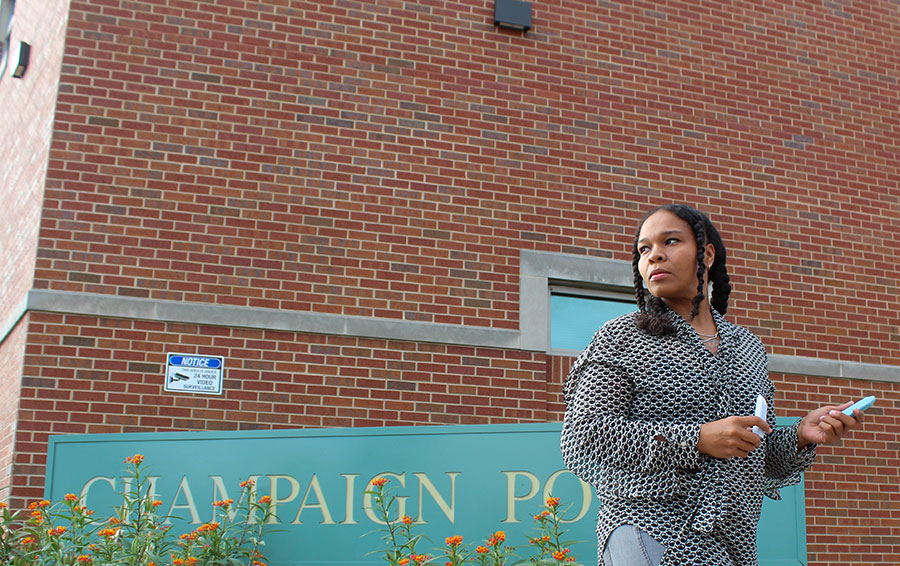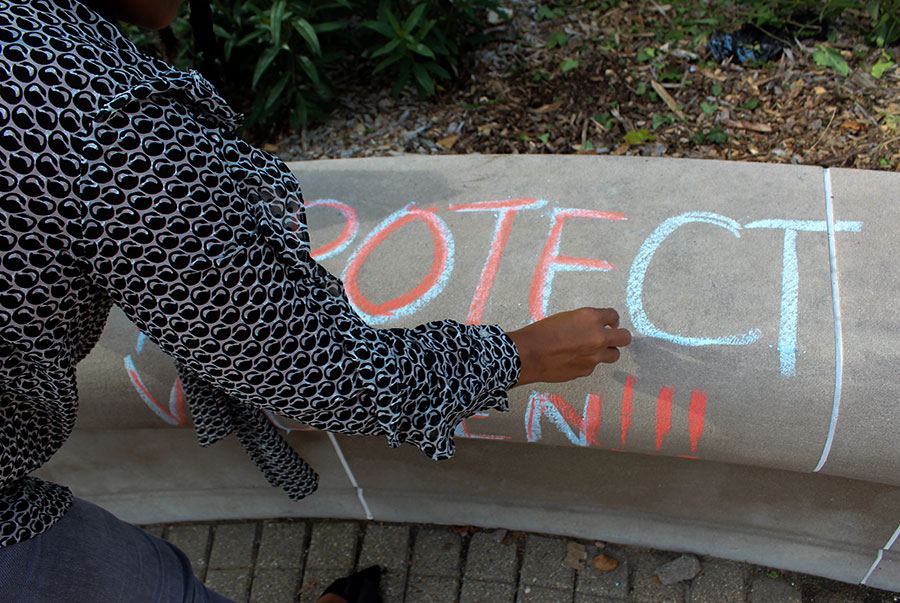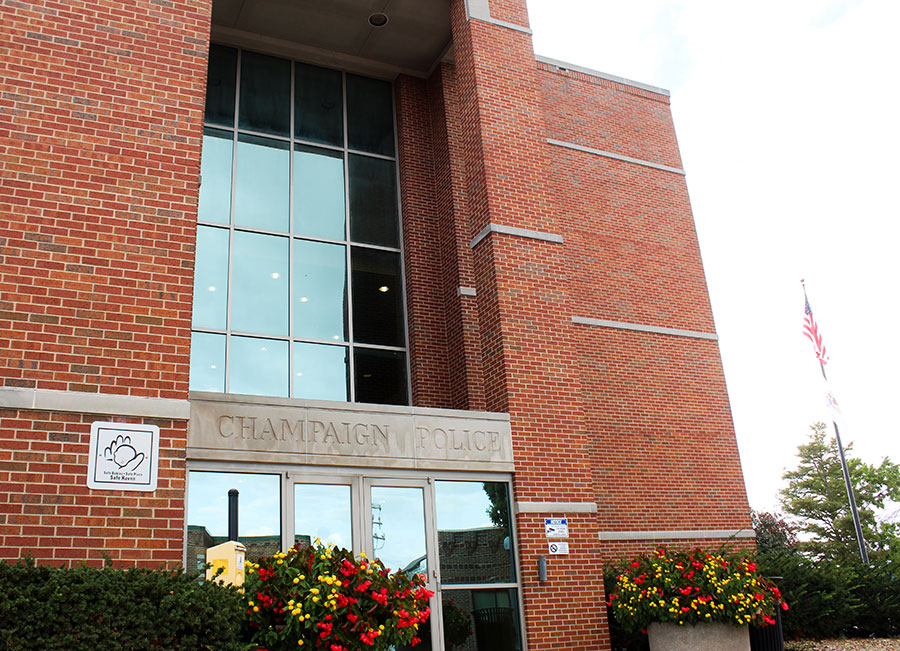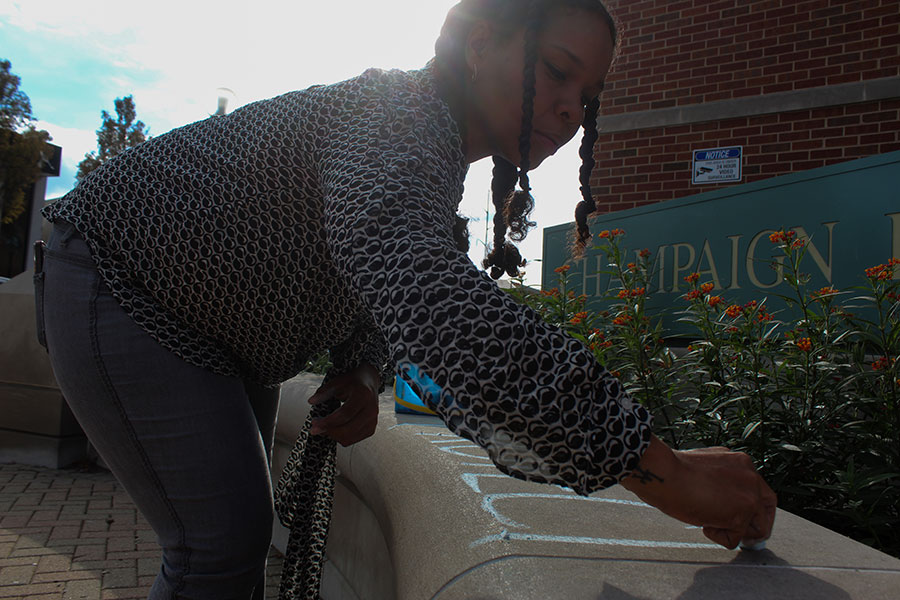Champaign Police investigate ‘agency culture’ of not following domestic violence reporting laws

Champaign resident Rita Conerly holds chalk outside the Champaign Police Department building off University Avenue on September 28, 2023. Conerly wrote "Protect Women" outside the department's building after an officer failed to file a report after she mad Farrah Anderson / Illinois Public Media and the Invisible Institute
This story is part of a partnership focusing on police misconduct in Champaign County between the Champaign-Urbana Civic Police Data Project of the Invisible Institute, a Chicago-based nonprofit public accountability journalism organization, and IPM Newsroom, which provides news about Illinois & in-depth reporting on Agriculture, Education, the Environment, Health, and Politics, powered by Illinois Public Media. This investigation was supported with funding from the Data-Driven Reporting Project, which is funded by the Google News Initiative in partnership with Northwestern University | Medill.
Champaign resident Rita Conerly called the police at 4:22 p.m. on Oct. 10, 2020, because her former partner — who she lived with for over a decade — was outside her home.
Champaign Police Officer Jonathan Kristensen responded to the call. First, he spoke with the caller, who shares children with her former partner. She told Officer Kristensen that her former partner did not have a driver’s license, but was driving anyway.
Officer Kristensen then asked Conerly if she wanted a present that her former partner, whom she had previously taken out an order of protection against, had brought her daughter.
“That is an insult,” she later told a dispatcher when she called to complain. “That is not a way to serve and/or protect me.”
She said she did not want the present, and Officer Kristensen approached her former partner. After speaking with him for only two minutes, Officer Kristensen said he would “let you guys go on your separate ways,” which the former partner agreed to.
The officer only spoke to Conerly for a minute and a half and left without taking a report, even after she told him the order of protection against her former partner had expired weeks earlier.
When he left, Officer Kristensen notified dispatchers, “Advice given. Spoke w all parties.”
That week, Conerly filed a complaint against the officer who responded to the call. Officer Kristensen failed to follow protocol and protect her from her abuser, she wrote in the complaint.
“He didn’t ask me for my name. He didn’t ask me for any other information for the incident that happened,” she said in an interview. “He did not ask for anything.”

Champaign resident Rita Conerly writes “Protect Women” using chalk outside of the Champaign Police Department on September 28, 2023. Conerly filed a complaint against the Champaign Police after an officer failed to file a report after she called the police during a domestic violence incident.
Farrah Anderson / Illinois Public Media and the Invisible InstituteThe Illinois Domestic Violence Act requires officers to file a police report when investigating “an alleged incident of abuse, neglect, or exploitation between family or household members,” something the Champaign Police Department’s policies also acknowledge.
The department mandates that if a person leaves and may return and batter the other individual, the officer is obligated to assist the other person to find a safe haven and obtain a temporary order of protection — not simply instruct the apparent subject of physical abuse to leave the area.
Conerly said her experience proved to her that the Champaign Police Department does not know how to handle domestic violence situations.
“I didn't feel listened to. I didn't feel respected. I didn't feel like they were going to respond to me appropriately,” Conerly said. The Invisible Institute generally does not identify survivors of intimate partner violence, but Conerly consented to tell her story on the record.
Two allegations in Conerly’s complaint against Officer Kristensen were sustained: That he failed to investigate a reported crime and to document that crime in a police report. The police department told Conerly that two of her allegations were sustained, but she said she was never told if Officer Kristensen was disciplined.
“As a person who has previously been a victim of his, I, in that moment, again, [was] feeling like a victim” — this time of the CPD, she said.
The situation was clearly a domestic violence incident based on Conerly’s allegations: Her former partner was harassing her, they have a child together and her order of protection against him had recently expired, investigation documents stated.
The CPD’s investigation into her complaint found that Officer Kristensen’s conduct violated CPD Rule 5(A)(3), which states, “Each officer shall take appropriate action on the occasion of a criminal offense, disorder, or other act or condition requiring police attention while on or off duty.” Officer Kristensen was issued a letter of reprimand in May 2021, according to a Freedom of Information Act request filed by the Invisible Institute.
A department spokesperson did not make Officer Kristensen available for comment.
What Conerly didn’t know is that, just two months after she filed her complaint, the CPD would order a department-wide retraining on exactly this issue, due to regular violations like Kristensen’s.
However, experts interviewed by the Invisible Institute have questioned how effective that retraining, ordered by then-Chief Anthony Cobb, really was.
A pattern of non-compliance
In September 2019, eleven months before Conerly made her call to the CPD, two Champaign Police officers responded to an apartment complex near Parkland College after a woman called 911 around 2 a.m.. She said her ex-boyfriend was battering and had jumped on her. A man could be heard yelling in the background of the call.
When the officers met her, the woman’s clothing was torn and the man had a hand injury, according to police records.
One of the officers told the woman to leave with a child who was present in the pair’s co-owned vehicle — her grandchild, as she later told police — while the man stayed behind. The officer wrote the parties were “uncooperative” in his incident report.
The officers cleared the call at 2:04 a.m. — less than 10 minutes after arriving. They took no offense report and made no arrest, like in Conerly’s case.
But less than seven hours later, the woman called the police again after returning home when she said the man refused to leave, according to police records. Two different officers responded. The woman was upset that the first officers who responded earlier didn’t arrest him.
Statements from the man and the woman confirmed an earlier physical altercation. The officers observed injuries on both people and photographed them. They, too, didn’t make an arrest due to conflicting statements, the records state.
A sergeant spoke with the woman later that day to follow up on the police’s response, and she told him she was surprised when the first two officers to respond had just told her to leave.
“Leave?” she told the sergeant she had said to the officers. “Do you see my neck? Do you see my body? This man just literally tried to choke me up in this car.”
A CPD lieutenant found the first responding officers had conducted a substandard investigation and failed to properly document the incident in a report.
The incident prompted the department to conduct a wider investigation that found one of the officers had committed nine department rule violations over six months, all during domestic-related calls, and the other had committed one rule violation.
The first responding officer had been disciplined three separate times for failing to complete police reports prior to the investigation. Following the investigation into the Sept. 8 complaint, then-Chief of Police Anthony Cobb issued the officer a four-day suspension, while a second officer, Kevin Pesavento, received counseling.
The first officer, Christopher Oberheim, was shot and killed when responding to an unrelated domestic disturbance call on May 19, 2021, after a suspect opened fire on officers.
Retraining an ‘agency culture’
While investigating the Sept. 8 complaint, the department recognized that these weren’t isolated incidents.
The policy violations “did not occur in a vacuum,” then-Chief Cobb wrote in his review of the investigation. In every case he was disciplined for, another officer was present in addition to Oberheim. The presence of other officers raised “a concern of systematic or agency culture of not complying with the Illinois Domestic [Violence] Act,” Cobb wrote.
Over a year after the 2019 incident, Cobb ordered a department-wide retraining on officers’ obligations under the act, and a review of the department’s policies and practices around domestic reporting, on Dec. 10, 2020.
More than three years later, questions remain about how extensive and effective the retraining and policy review were.
When requested to provide records and materials for the retraining, the department sent a 10-question, multiple-choice online test that went over different parts of the Illinois Domestic Violence Act, and a list of officers who completed the assessment.
That format was questioned by experts interviewed by the Invisible Institute. “One-off trainings are not ideal for a culture change,” said Dana Cuomo, a women's, gender and sexuality studies professor at Lafayette College in Pennsylvania who studies police responses to intimate partner violence. “That's a very kind of, ‘check the box, we've completed that’ kind of task.’”
The questions drove home that officers should be creating documentation of their responses to domestic disturbance calls, including taking photos of injuries and writing a police report, even if an arrest is not made.
The assessment did not address, however, specific questions officers should ask individuals during a domestic call, or other social factors and biases that may color how an officer perceives a survivor’s appearance and actions during a call.
This departs from best practices. Training should teach officers the right questions to ask when responding to a domestic disturbance and help them understand their implicit biases, said TK Logan, a University of Kentucky behavioral sciences professor. Survivors may not present and act in the way officers inexperienced in domestic violence calls would expect, she added.
In addition, advocacy agencies that work in domestic violence intervention should lead training rather than police officials, Kelly McBride, who heads the Indianapolis-based Domestic Violence Network, said.
Cobb did not see the implementation of the retraining through to the end, leaving in August 2021 to accept the role of deputy director of the Illinois Law Enforcement Training and Standards Board (he is now the director of the agency). He declined to speak on the record without permission from city administration. The assessment has not changed in the three years since it was ordered, according to CPD Sgt. Matthew Crane.
Because law enforcement in Illinois has become the front line and first response to domestic violence incidents, especially dangerous ones, their training in this area is crucial, said Governors State University social work professor Anjali Fulambarker Buehler, who studies officer decision-making when responding to intimate partner violence.
Advocacy organizations and researchers report that officers often don’t properly investigate what happened. They can also regularly disregard proper follow-up steps.
“I've talked to victim after victim who say [when] police came out, they didn't take a report,” Logan said. “We have to figure out how to make our police departments more accountable.”
CPD declined an interview, but a written statement from Petrilli in response to a question about the experts’ critiques reads that CPD utilizes “all available resources to ensure that our officers are equipped to address the concerns of our community,” listing “online policy review, in-person training at shift briefings, and group training with subject matter experts.”

The Champaign Police Department building on September 28, 2023.
Farrah Anderson / Illinois Public Media and the Invisible Institute
He allowed that “limited staffing has led to a reduction in the ability to hold larger, more in-depth courses,” but insisted that CPD “routinely work[s] to ensure that our officers are trained and prepared to meet the needs of our residents while also being compliant with department policies and State mandates.”
CPD declined to name any of the “subject matter experts” who have given group trainings, instead listing “certified trainers, representatives from third-party or non-profit groups, or local educators and clinicians” when asked.
All CPD sworn officers of all ranks have undergone the 10-question training within the last year, said Sgt. Matthew Crane in a statement. “That assessment remains part of the required review of the policy on an annual basis.” The CPD’s practices are compliant with training mandates related to domestic violence from the Illinois Law Enforcement Training and Standards Board, according to CPD Public Information Officer Joe Lamberson.
‘You need that paper trail’
Officers face specific challenges when responding to domestic disturbance calls — namely, the fact that they can include an ongoing crime, unlike some other calls they may respond to, said Elizabeth McGreal Cook. Cook is the CEO of Courage Connection, a nonprofit that supports domestic violence survivors in the Champaign area.
Determining who is and isn’t an abuser in the moment can be complicated, she said. Officers may also misunderstand the dynamics of domestic violence, and struggle to decide if a crime has been committed.
“A lot of times for police officers, domestic violence just looks like a disagreement between two parties,” Cook said. “What we do see, unfortunately, is that there are definitely instances that the victims are wrongfully arrested because they look like the abusers.”
Officers may also respond to the same address multiple times for domestic calls until the victim decides to leave or a serious assault or homicide happens, McBride said. Abusive relationships are complex, and survivors may not identify the abuse or they may face other factors that keep them in the relationship.
People often ask why survivors stay in abusive relationships, Cook said, and they stay for the same reasons that many people stay in a relationship with ups and downs: because abusers actively work to isolate survivors from support networks that help them see what is happening and seek protection from it.
Some officers may find things like repeatedly responding to one address frustrating, McBride said. That makes training critical for officers to understand the complexities around domestic violence and survivors’ perspectives.
Communities need trained and invested police officers to do domestic violence intervention, McBride said. The stakes can be high.
“If you're not trained, if you're not passionate, and you don't care, then this is not your wheelhouse really,” McBride said. Officers “have to be supportive, because that might be the only time a victim reaches out."
Improper action during domestic violence calls can lead to negative outcomes with lasting effects. Officers who don’t fill out required documentation leave survivors without a paper trail that can be used to establish a pattern and history with the abuser, she said.
“There needs to be a police report with every call, with every incident that goes out for domestic violence,” she said.
“You need that paper trail.”
Logan co-conducted a 2015 survey of women domestic violence survivors who called the National Domestic Violence Hotline that found they overwhelmingly were reluctant to contact police over concerns that officers would make the situation worse, not believe them or do nothing.
This is mirrored locally: in Illinois, a survey released in July 2022 by The Network: Advocating Against Domestic Violence found that while domestic violence hotline calls in the state went up 9% over 2021, the number of survivors reaching out to police went down 5%.
The paper trail can help survivors obtain a protective order, and that order can help bring charges against an abuser. The paper trail can also affect what charges an offender faces if legal action is taken.
In some cases, stalking charges could be pressed, McBride said.
“If he's driving by your house, or slashing your tires, or busting out your windows, you want to insist on a police report because you know it's that person,” she said. “You can't maybe prove it, but you know in your gut, and so having that paper trail is going to help judges and courts and whatnot, in the legal sense.”
The legal system just recently started criminalizing domestic violence within the last 50 years, after largely ignoring family and domestic violence through the early 1970s. Women couldn’t obtain a restraining order from an abusive husband without simultaneously filing for divorce until legal reforms in the late 1970s, according to a 1995 report by Columbia University law professor and criminologist Jeffrey Fagan.
Advocates reported that police rarely arrested men who battered their partners, including in domestic violence incidents with probable cause, dating back to the 1960s, according to the report.
The criminal justice system is not a safety plan, but removing someone from a dangerous situation could save someone’s life in the short-term, said Logan, the University of Kentucky behavioral sciences professor. It could also make a situation worse.
Law enforcement and legal intervention represent only a small portion of the tools available to help survivors potentially gain safety, depending on what they want, she said.
“Most of them just want peace in their lives and want the abuse to stop.”
Advocates for domestic violence intervention vary on what role they think police should have in a solution. Police abolitionists argue that law enforcement should have no role in intervention and instead propose alternative solutions, such as restorative and transformative justice models.
Restorative justice models may include communities as a significant part of the solution, she said. Yet communities may not be fully equipped to recognize abusive behaviors, especially with modern technology in the picture.
Abusers can use technology to continue harassing, attempting to control and surveilling survivors when they’re located somewhere else and no longer in a relationship, she said, and community members may struggle to monitor the abusive behavior.
Communities need to address the societal issues that contribute to domestic and gender-based violence long before police respond to a call, said Buehler, the Governors State social work professor.
Often too much is asked of officers, especially in under-resourced departments, she said.
“We need to have multiple avenues of response, as well as prevention, and really, truly addressing the issue as a society.”

Champaign resident Rita Conerly writes “Protect Women” with chalk outside the Champaign Police Department. After her experience with the Champaign Police Department, she hopes the department will protect future survivors of domestic violence.
Farrah Anderson / Illinois Public Media and the Invisible InstituteNo further changes
Since Anthony Cobb left his position as CPD’s chief, Timothy Tyler has been hired for the position. A longtime Illinois State Police trooper and then supervisor, he later served as the director of law enforcement for the Illinois Department of Natural Resources. The department declined to make him available for an interview.
“Chief of Police Timothy T. Tyler reviewed all policies as part of his onboarding to the department in 2022,” according to CPD Public Information Officer Joe Lamberson. “He has not requested any changes to the Department’s policy or current training practices related to domestic violence.”
Rita Conerly, the Champaign resident who complained about her experience with a CPD officer after he failed to take a report, said the retrainings don’t go far enough. Making sure officers learn more about domestic violence and how to respond to calls is essential to making sure victims get the help they need, she said — and the 10-question annual quizzes won’t cut it.
“The lack of experience that either officers have had working with domestic violence, or just the lack of knowledge — it's disappointing,” said Conerly, who has also called for police reform in the Champaign area.
Because she still receives threatening social media messages from her former partner, Conerly worries about what would happen if she needed to call the police again. She also worries about what might happen to future victims of domestic violence who might need help like she did.
“I don't believe that they will ever protect me effectively,” Conerly said.
Farrah Anderson is an investigative reporting fellow with the Invisible Institute and Illinois Public Media, and a journalism student at the University of Illinois.
Diana Leane reported on this story while a Medill School of Journalism graduate intern with the Invisible Institute.
If you or someone you know is experiencing domestic violence, you can call the National Domestic Violence Hotline for help at 1-800-799-SAFE (7233), or go to thehotline.org. If you’re in the Champaign area, you can contact Courage Connection’s 24-hour hotline at (217) 384-4390 or (877) 384-4390, or visit its website at courageconnection.org.

